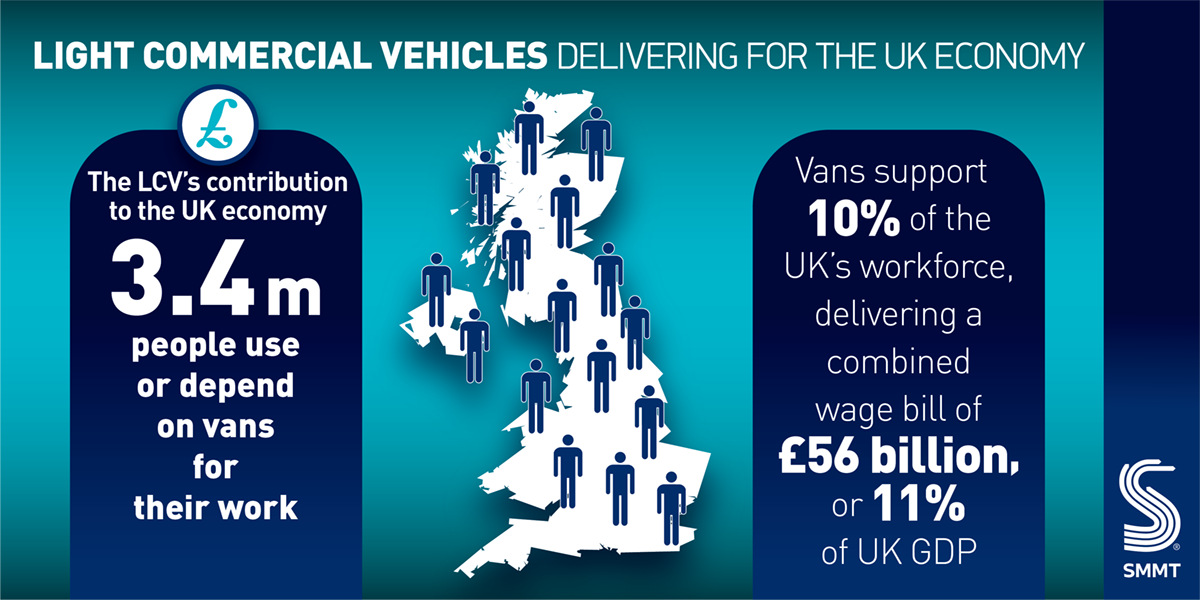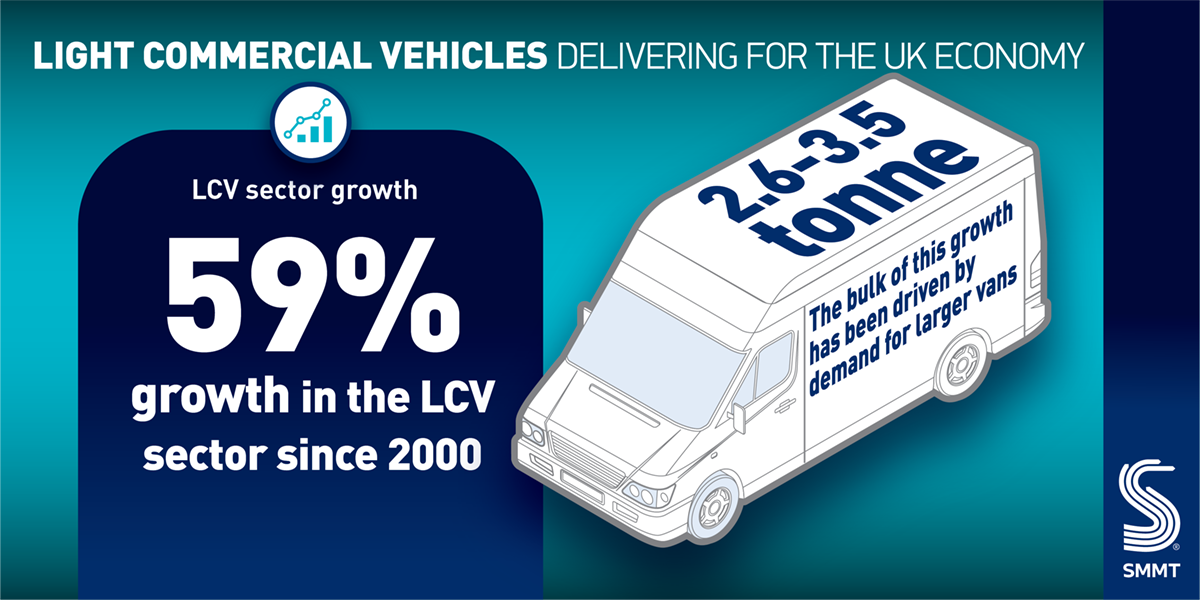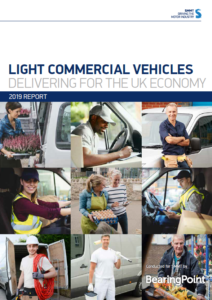- One in 10 workers in the UK uses or depends on a van for their work, a total of 3.4 million people.
- New report finds vans contribute annual £56 billion to economy from wages alone – 11% of UK GDP.1
- UK average new van CO2 down -10.4% since 2013, highlighting the important role new vans play in reducing emissions.
- Industry highlights vital role Britain’s 4.6 million vans play in driving our economy and society as UK’s biggest commercial vehicle show opens.
The extent British businesses depend on vans is revealed today by new research published by the Society of Motor Manufacturers and Traders (SMMT) and management and technology consultancy, BearingPoint.2 Without a van, 3.4 million people – 10% of the UK’s workforce – would not be able to do their jobs, with an estimated 500,000 driving one as their main role.
The report, Light Commercial Vehicles: Delivering for the UK Economy, highlights for the first time the vast economic and social contribution made by the 3.4 million UK van users and employees of businesses that depend on them, with a combined wage bill of at least £56 billion, equating to 11% of GDP. However, this figure only accounts for part of the contribution vans make to the economy. The UK is home to two major van manufacturing plants, as well as a thriving sub-economy of van conversion companies and a strong aftermarket sector. Around 900,000 used vans change hands every year, while the annual new light commercials market is estimated to be worth nearly £10 billion.3
The UK van parc has experienced significant growth in recent years, up 59% since 2000 – almost double the growth seen in cars. The boom in online shopping, in particular, has seen a surge in demand for delivery vans. The UK is now the EU’s biggest online retail market, with 83% of consumers here buying goods and services online, compared with the EU average of 60%.4 Meanwhile, the rapid rise in the number of self-employed people, up from 3.3 million in 2001 to 4.8 million in 2017, has also been a key driver of van growth, with the trend to vehicle downsizing another factor.5
As well as the vehicles registered to businesses, the report suggests that the majority of privately owned vans are operated by a booming sole trader and SME sector. The van is an essential tool of the trade for these owner-operators, who depend on them for their livelihood. The report also suggests that, despite additional costs, vans operated by sole traders and SMEs tend to be at a higher specification. Small businesses are now taking advantage of the latest innovations in safety and comfort, often as a reflection of their professionalism. New vans now offer a variety of features, including advanced driver assistance, lane departure warning and autonomous emergency braking systems, all of which help to improve the sector’s already strong safety record.
The report highlights the vital role vans play in delivering for society and for the economy. Almost all (96%) of these vehicles are powered by diesel, which delivers the high levels of efficiency and performance needed to transport goods over long distances. The commercial vehicle sector has invested heavily to ensure that the Euro 6 diesel vans on sale today are the cleanest in history. The development of the latest low emission technology has resulted in new vehicles that have virtually eliminated particulates and have vastly reduced NOx. Furthermore, UK average new van CO2 fell to 166.93g/km last year, down -10.4% since 2013, highlighting the important role new diesel vans play, and will continue to play, in reducing emissions.6
Manufacturers are investing heavily to bring an exciting range of ultra-low and zero emission vans to market. While there is an increasing appetite for these vehicles, demand remains low, accounting for just 0.3% of the market in 2018. To increase uptake, a number of barriers must be removed, including tackling range and payload anxiety and addressing the sector’s specific charging needs.
Mike Hawes, SMMT Chief Executive, said,
The UK’s van fleet is the backbone of our society, driving our economy and allowing millions of workers to carry out jobs that our country relies on. Industry is supporting these businesses by responding to a changing society, developing and delivering the cleanest and safest vehicles in history. To continue to thrive, this vital sector needs policies and incentives that encourage businesses to invest in the latest technology that best suit their needs to help them deliver for Britain.
James Rodger, Partner and UK&I Lead, BearingPoint, said,
The data analysis and interviews that we have conducted highlight the key role that the LCV sector plays in the UK economy. The report brings the data and the qualitative insights together to paint a picture of a diverse and vibrant sector which touches all our lives on a daily basis. Advancements in technology in the sector will ensure that the LCV continues to play a pivotal role in the years to come. We hope that this report contributes to the better understanding and appreciation of the LCV sector in the UK.
Around 21,000 people are expected to attend the Commercial Vehicle Show, which opens its doors today at the NEC in Birmingham. Now in its 20th year, CV Show 2019 will see 460 companies exhibiting, including some of the biggest van and truck names on the market. The show runs from 30 April to 2 May and entry is free. Find out more at www.cvshow.com
Notes to editors
1. Based on national minimum wage of workers who directly use a van and employees of van-dependent businesses
2. Light Commercial Vehicles: Delivering for the UK Economy
3. SMMT data
4. Eurostat: eCommerce statistics (2018)
5. Trends in Self-Employment in the UK Office for National Statistics
6. UK average new van CO2 was 186.39g/km in 2013











